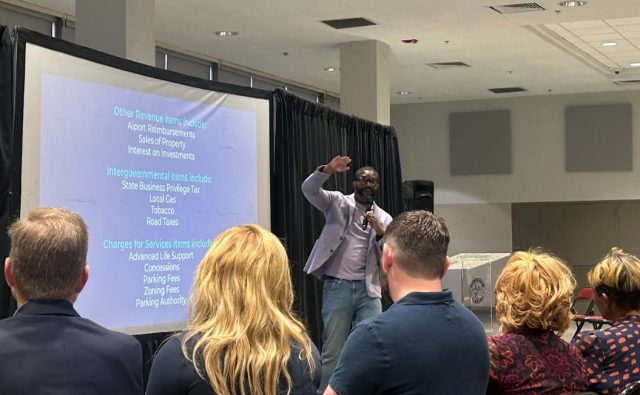
By Sym Posey | The Birmingham Times
Robert Walker, president of the Wahouma Neighborhood and East Lake community, said his neighborhood has a problem that “affects overall neighborhood vitality” and only the City of Birmingham can address it.
“A lot of properties sitting there are dilapidated, they’re investment properties. There is not much we can do about that, but we look to city hall to do something about that,” said Walker, during the city’s second annual budget town hall last week at Boutwell Auditorium.
Mayor Randall Woodfin spoke to a crowd of community leaders, representatives, and Birmingham residents on the city’s 2024-2025 spending plan which he said addresses some of Walker’s concerns.
“Our priorities are your priorities. … The things you desire, the things you complain about, are the things we spend the most money on in neighborhoods,” Woodfin told the audience.
According to the city’s official operation budget for FY25 , total revenues increased to $582 million from the previous year, which was $576 million.
Woodfin said neighborhood investments increased to $21 million from $18.2 million. Of that spending, sidewalk projects grew the most, from $200,000 to $1 million. Traffic calming doubled from the previous year, to $500,000.
Other highlights included:
• Costs for city departments increased to $505 million from $464 million. Non-departmental spending — which includes everything from pensions to employee parking — fell by more than half, to $10.4 million.
• Youth services spending has remained steady for the past three fiscal years, at about $6 million. However, the 2025 fiscal year did include an additional $250,000 put toward the Small Magic early childhood education program.
• Transportation spending also stayed steady from the previous fiscal year, at $16.7 million. Woodfin said he would like to expand public transportation, but the state constitution has been an issue, saying it directs public funds to roads and bridges, but excludes funding for buses.
“We live in the state of Alabama where a significant amount of people, who live in urban and rural Alabama, are working class Alabamians who simply need to get to their job or simply need to get to their doctors’ appointment, or need to get somewhere,” said Woodfin. “They deserve more efficient public transportation. The best way to do that is have the state fund public transportation.”
The city soon will be drafting a budget for the 2025-2026 year, due by July 1.




